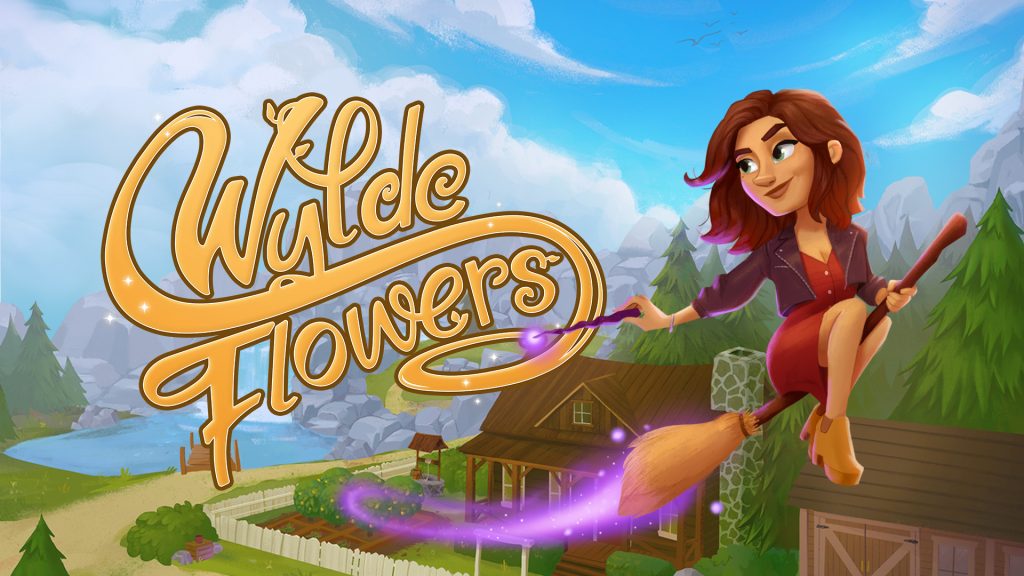“A farm life sim but you’re a witch” is an extremely enticing proposition. Games about settling down in a quaint little town and running a farm while getting to know the locals—the old Harvest Moon model that’s grown so popular in the wake of Stardew Valley—are delightful. Being a cute lil’ witch, casting spells and hanging out in a friendly coven (don’t worry, not the nightmare fuel Anjelica Huston style of witchery) is always going to be a joy. Combining the two seems like a recipe for magic (sorry, not sorry), but a good idea is worth only so much without a solid design to back it up. Luckily, Wylde Flowers has the goods.
While the mechanical mashup is clever—and I’ll get to that in a moment—the thing that really makes Wylde Flowers stand out, from the second you load it up, is its abundance of personality. At first brush, Fairhaven is a quaint little town like any other, but it’s one that feels rich and alive from the second you step off the boat. Part of that is in the colourful architecture that teases a history that runs deep, but the bigger part is the cast: an eclectic mix, as games like these always have, but with a rare sense of connection. Fairhaven’s residents aren’t simply people coexisting, but a community: not everyone gets along, not everyone sees eye to eye on everything, but they’re a bunch of folks with the kinds of relationships that living in a little village together inevitably form. From the get go, they feel like real people with a real history together.

And Tara Wylde is part of that history. Like I mentioned in my preview from earlier this year, Wylde Flowers stands apart from its peers in the decision to have pre-defined protagonist rather than a player-created character, and it’s one of the game’s biggest strengths. Tara is fun, determined, kind-hearted, a little goofy sometimes—all the makings of an endearing main character—and she also has her own history with Fairhaven . It’s where she was born and lived her childhood years, before moving to the city, so she’s returning to a place she knows, full of people she mostly knows, but with all the changes that years apart can bring. Coming back to look after her ailing grandmother (and help run the family farm) is a chance to reconnect with her roots.
And with that as the backdrop, Wylde Flowers embarks on heartfelt story of family, community, and connection. For all its magical flourishes and witchy delights, it’s ultimately a grounded and thoughtful tale about accepting people for who they are and finding a place to call home. It’s cute, often funny, occasionally heartbreaking, but beautiful all the way through—and carried by some stellar performances from a star-studded vocal cast and some wonderfully emotive animation. Side stories and budding friendships (and romances!) help to flesh out the supporting cast, while opening the door to some similarly delightful tales.
That narrative framing allows Wylde Flowers to take a more plot-driven approach to the whole farm life sim. I’d never suggest that games like Story of Seasons are light on narrative—quite the opposite—but here, the unfolding plot takes centre stage, and drives the farming side of things forward as much as the other way round. Yes, you’re playing a day at a time, managing your crops and enjoying those little daily interactions with the rest of the crew, but the central storyline ties those things together, gives them context, and even determines the flow of the calendar—in Wylde Flowers, the turning of each seasons is a major story beat. It’s no better or worse than the slice-of-life style of narrative that games like this usually employ, but it’s different. It creates a different sort of atmosphere, and puts the farming game into a different context. It’s refreshing.

Likewise, that whole magical twist on farming creates an interesting dynamic to how that whole game loop plays out—a quick “hurry up and grow, please!” spell is more than a little handy when it comes to a productive field. But magic in Wylde Flowers isn’t simply about making farming more convenient; there’s a symbiotic relationship there that adds a clever layer to whole affair. Whether you’re brewing potions or writing incantations, magic needs reagents, many of which will come directly from your farm.
As you become a more adept witch, you’ll learn to manipulate the weather and even control the seasons, though these more powerful spells require rarer ingredients. Not everything you need can be grown; you’ll need to forage, delve into the nearby mines, and even cross over into another, magical plane of existence. Sometimes you’ll need particularly exotic ingredients that can’t easily be found without spending some coin at a witchy vendor. Magic isn’t just about farming, either: it can help you get around more conveniently, support efforts to get to know the locals, play a vital role in completing quests, and even play a vital role in how certain story beats unfold.
In that, Wylde Flowers finds the robust foundation of a fun, seemingly playful concept. Synergy between farming and social life is nothing new for these sorts of games—how many home-grown flowers have you given to your favoured love interests, over the years?—but magic adds a new dimension to the mix. It changes how you farm, what you choose to grow (and when), and how you interact with the people of Fairhaven. It’s also just, y’know, a lot of fun to be able to summon a raincloud when you need to!

Convenience goes beyond the spells you cast. Just about every aspect of Wylde Flowers’ user interface and overall design seems intended to be as handy as possible: context-sensitive interactions that mean you don’t have to worry about switching tools all the time; a nicely-presented inventory without any sort of limits or the associated management hassles; a record of townsfolks’ favourite gifts (once discovered) and shop opening hours kept handily in your diary to view whenever you want to. There can be some minor annoyances with targeting when you have a bunch of interactable objects in close proximity, but by and large, the game makes the minutiae as effortless as possible.
There’s some small trade-off to this—and to other aspects of the game’s design—in complexity. The farming and social systems in Wylde Flowers are fun and fit the rest of the game’s design well, but with fewer crop types, a smaller farming area, fewer tools (and upgrades for them), and more options for automation in the later part of the game, there isn’t quite the same level of detailed involvement as in something like Story of Seasons. In other words, don’t expect to be laying out a spreadsheet to meticulously plan your planting schedule for the coming season—for better or worse. It works well for what Wylde Flowers is, especially in terms of farming being a component of the overarching narrative, but if you come in expecting something more meaty, you might be a little disappointed.

As the farming life sim genre continues to flourish, it becomes harder and harder for such games to stand out—but Wylde Flowers manages to do so, and does it brilliantly. Magic puts a clever twist on farming to bring fun new layers to the familiar, and the heartfelt story of acceptance and finding a place to call home to ties everything together beautifully. Wylde Flowers is an utter delight.
Reviewed on PC. Originally published on Shindig.
With its magical spin on farm life sims and a heartfelt story of acceptance and finding a place to call home, Wylde Flowers is an utter delight.

